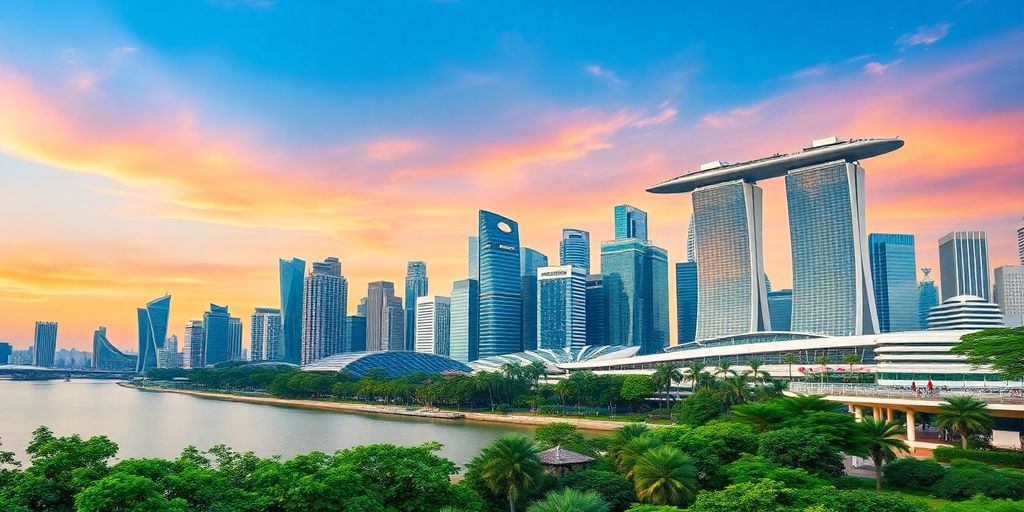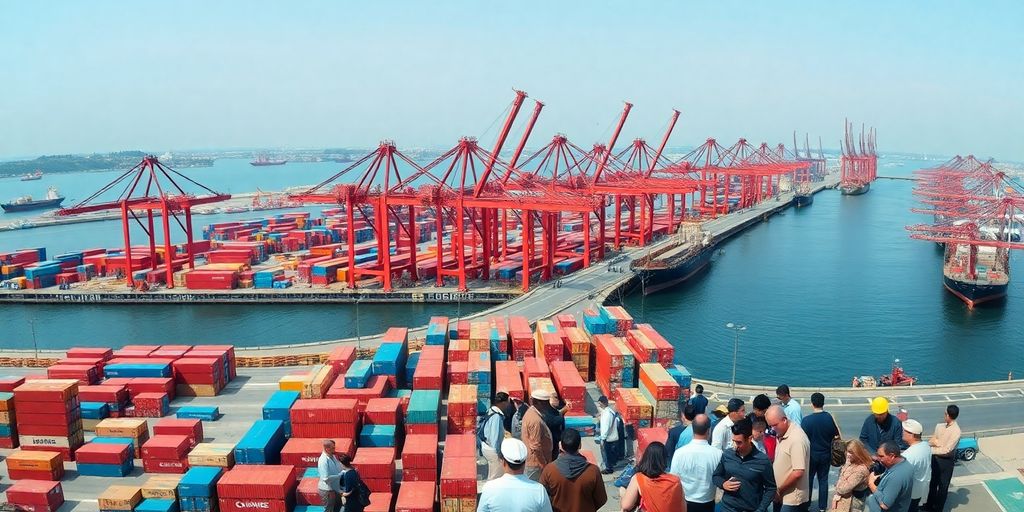Why is Singapore so Successful: Key Factors Behind Its Economic Triumph

Singapore’s rise to success is like that unexpected plot twist in a movie that leaves everyone talking. It’s not just luck or timing. There’s a mix of smart choices and hard work behind it all. From its prime location to sound policies, Singapore has crafted a story of growth and stability. And it’s not just about numbers; it’s about creating a place where businesses and people can thrive.
Key Takeaways
- Singapore’s strategic spot on the map makes it a major player in global trade.
- The country’s business-friendly policies and low taxes attract investors from all over.
- Education is a big deal here, ensuring a workforce that’s ready for today’s challenges.
- Political stability and effective governance have kept Singapore on a steady path.
- Innovation isn’t just a buzzword; it’s a real thing with support for startups and tech advancements.
Strategic Geographic Location

Proximity to Major Trade Routes
Singapore’s location is a massive advantage. Nestled at the crossroads of important trade routes, it acts like a gateway between the East and West. Ships from all over the world pass through its waters, making it a bustling hub for international trade. This strategic positioning has been a key factor in Singapore’s economic rise.
Access to Global Markets
Being so centrally located means Singapore has easy access to huge markets in Asia, Europe, and beyond. This connectivity attracts businesses looking to expand their reach. Nearly 6000 US companies are active in Singapore, focusing on innovation and regional growth, which shows how attractive Singapore is for global enterprises.
Natural Deep-Water Ports
Singapore’s ports are among the busiest in the world. Thanks to its naturally deep waters, it can accommodate massive vessels, making it a preferred stop for shipping lines. This capability not only boosts trade but also strengthens its position as a leading maritime center.
Singapore’s location isn’t just about geography; it’s about opportunity. With every ship that docks, the city-state reaffirms its status as a crucial node in global trade.
Robust Economic Policies
Singapore’s economic policies are a major driver of its prosperity. They are designed to create an environment that supports business growth and attracts investments from around the globe.
Pro-Business Environment
One of the standout features of Singapore’s economic model is its pro-business stance. The government actively reduces red tape and bureaucracy, making it easier for businesses to set up and operate. This approach not only attracts multinational corporations but also supports local entrepreneurs in their ventures.
Low Tax Rates
Singapore’s tax system is another key factor in its success. With some of the lowest corporate tax rates globally, businesses find it financially attractive to headquarter here. The simplicity and transparency of the tax system further enhance its appeal, encouraging compliance and reducing administrative burdens.
Investment in Infrastructure
The city-state invests heavily in infrastructure, ensuring that its transport networks, telecommunications, and utilities are world-class. This commitment to infrastructure not only improves the quality of life for residents but also supports the efficient operation of businesses. A well-developed infrastructure is essential for maintaining Singapore’s competitive edge in the global market.
Singapore’s economic policies are not just about growth—they’re about creating a sustainable and inclusive environment where businesses and individuals can thrive.
Skilled Workforce
High Education Standards
Singapore’s education system is often praised for its high standards and rigorous curriculum. The focus on math, science, and technology from an early age ensures that students are well-prepared for the demands of the modern workforce. Schools here are equipped with the latest technology, and teachers are highly trained, making education a top priority for the government. This dedication to quality education creates a pool of well-educated individuals ready to contribute to various sectors.
Focus on Lifelong Learning
In Singapore, learning doesn’t stop at graduation. The government encourages continuous education through various initiatives and subsidies. Programs are available for adults to upskill and reskill, ensuring that the workforce remains relevant in a rapidly changing global market. This culture of lifelong learning keeps the workforce adaptable and innovative.
Attraction of Global Talent
Singapore is a magnet for global talent, thanks to its open immigration policies and vibrant economy. The city-state actively attracts professionals from around the world, enriching the local talent pool with diverse skills and perspectives. This influx of international talent not only fills skill gaps but also promotes a multicultural environment that fosters creativity and innovation.
Singapore’s economy thrives on a highly educated workforce that fosters innovation and fills skilled job roles, significantly contributing to business growth.
Political Stability
Effective Governance
Singapore’s government is known for its strong and effective governance. The city-state has a well-organized political framework that ensures stability and efficiency. The government is proactive, often anticipating challenges and implementing policies that address potential issues before they become problems. This approach has been key in maintaining a stable environment that fosters economic growth.
Low Corruption Levels
Corruption is a major issue in many countries, but not in Singapore. The city-state consistently ranks among the least corrupt countries in the world. This is achieved through strict laws and a transparent legal system. The low levels of corruption have built trust among investors and citizens alike, contributing to the country’s economic success.
Long-Term Policy Planning
Singapore’s government is known for its long-term planning. Policies are not just focused on immediate gains but are designed to ensure sustainable growth for future generations. This includes investments in infrastructure, education, and technology, which are seen as critical to maintaining Singapore’s competitive edge. The foresight in policy-making has been instrumental in Singapore’s ability to adapt to global economic changes and maintain its growth trajectory.
In Singapore, political stability isn’t just about keeping the peace; it’s about creating an environment where businesses can thrive and economic growth can be sustained. With a consistent annual growth rate of +5.4% in the 2000s and +5% in the 2010s, the results speak for themselves.
Innovation and Technology
Singapore is making waves in the tech world, and it’s no accident. The country has put a lot of effort into creating a supportive environment for innovation and technology. Let’s dive into some of the key areas where Singapore shines.
Support for Startups
Singapore is a hotbed for startups. The government offers a variety of grants and incentives to help new businesses get off the ground. This support isn’t just financial; there are also mentorship programs and networking opportunities that help startups thrive. The result? A vibrant ecosystem where new ideas can flourish.
- Financial Incentives: Grants and funding options to reduce startup costs.
- Mentorship Programs: Guidance from experienced entrepreneurs.
- Networking Opportunities: Events and platforms to connect with potential investors.
Investment in Research and Development
Research and development (R&D) is a big deal in Singapore. The government invests heavily in R&D to drive innovation in various sectors, from healthcare to green energy. This focus on R&D not only boosts the economy but also attracts global companies looking for a place to innovate.
- Government Funding: Substantial investments in R&D projects.
- Collaborations: Partnerships between universities and industries.
- Innovation Hubs: Dedicated spaces for research and development.
Smart Nation Initiatives
Singapore is on a mission to become a "Smart Nation." This means using technology to improve the lives of its citizens. From cashless payments to smart public transport systems, the city-state is leveraging technology to create a more efficient and sustainable urban environment.
- Digital Infrastructure: High-speed internet and smart city solutions.
- Public Services: Digital platforms for government services.
- Sustainability Efforts: Tech-driven solutions for environmental challenges.
Singapore’s commitment to innovation and technology has not only transformed its economy but also positioned it as a leader in the digital age. The city’s embrace of technology is a blueprint for others looking to harness the power of innovation for economic growth.
Diverse Economy

Singapore’s economy is like a well-oiled machine, running smoothly thanks to its diverse sectors. This diversity is one of the key reasons behind its success, making it resilient to global economic shifts.
Financial Services Sector
The financial services sector is a powerhouse in Singapore, contributing significantly to the country’s GDP. It’s a hub for banks, insurance companies, and investment firms. Singapore’s strategic location makes it a vital hub for international trade and commerce, attracting businesses worldwide. The presence of a robust regulatory framework ensures trust and stability, encouraging both local and foreign investments.
Manufacturing and Trade
Manufacturing is another pillar of Singapore’s economy. The country focuses on high-value manufacturing sectors like electronics, chemicals, and biomedical sciences. This focus has helped Singapore become a leading exporter in these industries. The government supports this with policies that encourage innovation and efficiency in production processes.
Tourism and Hospitality
Tourism is not just about sightseeing in Singapore; it’s an experience. From world-class attractions like Marina Bay Sands to cultural districts like Chinatown, Singapore offers something for everyone. The hospitality industry thrives on this diversity, providing excellent services that attract tourists from all over the globe. The blend of modernity and tradition makes Singapore a unique destination.
With its diverse economy, Singapore stands out as a model for other nations. Each sector complements the others, creating a balanced and robust economic landscape that many countries strive to emulate.
Cultural Diversity and Inclusivity
Multicultural Workforce
Singapore is like a vibrant tapestry woven with threads from various cultures, making its workforce one of the most diverse in the world. People from different ethnic backgrounds—Chinese, Malay, Indian, and others—come together, bringing unique perspectives and skills to the table. This diversity is not just about numbers; it’s about creating a rich environment where ideas can flourish and innovation can thrive. In such a setting, businesses find themselves at an advantage, tapping into a wide range of insights and experiences.
Social Cohesion Policies
To ensure harmony among its diverse population, Singapore has implemented several social cohesion policies. These include public housing policies that encourage ethnic integration and community bonding activities that bring people together. The government also supports initiatives that promote understanding and respect among different communities, ensuring that everyone feels included and valued.
Community Engagement Programs
Community engagement programs play a pivotal role in enhancing inclusivity in Singapore. These programs are designed to foster interaction and collaboration among residents of various backgrounds. Whether it’s through cultural festivals, neighborhood events, or volunteer opportunities, these initiatives help build bridges between communities, creating a sense of belonging and mutual respect.
Singapore’s approach to diversity and inclusivity is not just about celebrating differences but about building a cohesive society where everyone has a stake in its success. This strategy has been instrumental in shaping the nation into a harmonious and progressive society, setting a benchmark for others to follow.
For more insights into how diversity and inclusion can drive sustainable business growth, check out our D&I guide.
Conclusion
Singapore’s journey to becoming a global economic powerhouse is nothing short of remarkable. It’s a story of strategic planning, relentless innovation, and a commitment to education and infrastructure. The government has played a pivotal role, creating an environment where businesses can flourish and talent can thrive. Education has been a cornerstone, producing a skilled workforce ready to tackle the challenges of a rapidly changing world. The vibrant start-up culture and innovation ecosystem have attracted global attention, turning Singapore into a hub for tech talent and investment. As Singapore continues to lead in software creation and technological advancements, it sets a benchmark for other nations. The city-state’s success is a testament to what can be achieved with vision, dedication, and a willingness to embrace change. As we look to the future, Singapore’s example serves as an inspiration for countries aiming to carve out their own path to economic success.
Frequently Asked Questions
What makes Singapore’s location special for trade?
Singapore is located near major trade routes, making it easy for ships to pass through and trade with other countries. This helps Singapore connect with global markets.
How does Singapore support businesses?
Singapore has friendly rules for businesses, low taxes, and invests a lot in things like roads and technology to help companies grow.
Why is Singapore’s workforce considered skilled?
Singapore focuses on good education and encourages people to keep learning throughout their lives. It also attracts talented people from all over the world.
What contributes to Singapore’s political stability?
Singapore has a government that plans for the long term, with low levels of corruption and effective management, which helps keep the country stable.
How is innovation encouraged in Singapore?
Singapore supports new businesses and invests in research and technology. It has initiatives like Smart Nation to drive innovation.
Why is cultural diversity important in Singapore?
Cultural diversity brings different ideas and talents together, helping Singapore grow. It also promotes understanding and harmony among its people.







Responses